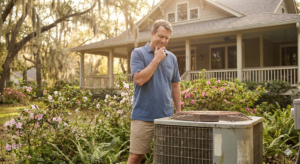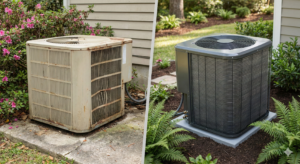When your HVAC system isn’t working like it should in the middle of a Charleston summer, the issue might go deeper than the thermostat or vents. One part that tends to get overlooked is the air handler. This key component plays a big part in keeping cool, comfortable air flowing in your home. When there’s a problem with it, the entire system can struggle or shut down completely. That’s why it helps to understand what an air handler does and what can go wrong with it.
Homeowners in Charleston face long, hot summers, and a properly working HVAC system is a big deal. Knowing what to look out for with your air handler can save you from discomfort and even bigger repairs down the road. Let’s take a closer look at how this part works and what can cause it to stop doing its job.
What Is an HVAC Air Handler?
An HVAC air handler is a core part of your system. It moves air through your ducts and distributes it throughout the house. While the AC unit cools the air and the furnace heats it, the air handler is responsible for sending that conditioned air to the rooms that need it. Think of it as the middleman between your HVAC system and your living space.
Air handlers usually sit inside and work year-round. They contain several internal parts, including:
1. A blower or fan to push the air through the ductwork
2. Coils that can either heat or cool the air before it’s pushed out
3. Filters that help clean the air before it moves into your home
4. Dampers that guide airflow to the proper areas
Without the air handler, none of that cooled or warmed air reaches the inside of your house. Even if your AC or heating components are running fine, a broken or clogged air handler can keep the comfort from spreading. For example, if you notice the vents barely blowing air but the outside unit seems to be working, the air handler could be the issue. In that case, it’s not the AC to blame, but the system responsible for moving the air.
Common HVAC Air Handler Issues
Just like other parts of your system, air handlers can run into problems. The good news is that many of the warning signs are subtle but noticeable once you know what to listen for or look at.
Here are some of the most common air handler problems:
1. Clogged filters – When air filters inside the handler get dirty, airflow slows down. This can cause the system to work harder and less efficiently.
2. Blower motor failure – If the blower motor stops working, air won’t circulate. You might hear unusual noises or feel barely any air coming from the vents.
3. Frozen coils – A buildup of condensation or airflow issues can cause the coils to freeze up, which blocks the system from effectively cooling the air.
4. Leaky or blocked drain lines – Water from condensation can back up or leak when the drain line gets clogged, leading to water damage or system shutdowns.
5. Loose or damaged wiring – Faulty electrical connections can prevent the air handler from running at all or may cause inconsistent performance.
Many of these issues will show up as reduced air pressure, strange noises, musty smells, or sudden changes in temperature control. If it feels like your HVAC system is working hard but not doing much, the air handler may be part of the issue.
How to Prevent Air Handler Problems
Preventing air handler issues can save both time and money. Regular attention and maintenance go a long way in keeping everything running smoothly. Here are some straightforward ways to avoid common problems:
1. Replace filters regularly: Change air filters every month to keep airflow optimal and prevent strain on the system.
2. Keep the area clean: Ensure the space around the air handler is free from dust and debris. This can aid in keeping it functioning without obstructions.
3. Inspect coils and drain lines: Check the coils for signs of dirt and the drain lines for any blockages. Regular cleaning helps avoid freezes and leaks.
4. Listen for strange sounds: Pay attention to unusual noises. Noticing them early can prevent bigger issues.
5. Schedule regular maintenance: Having professionals check your air handler at least once a year keeps it in top shape and catches problems before they worsen.
Routine checks and basic care can prevent smaller issues from becoming major headaches. For example, changing filters regularly not only improves air quality but also extends the life of the unit.
When to Call a Professional
Despite best efforts at maintenance, there are times when calling in a professional is the best course of action. Handling complex issues without the right skills or tools can lead to additional damage. Here’s when you should consider professional help:
– Persistent problems: If an issue like poor airflow or strange noises continues even after you’ve done initial checks, it’s time for expert advice.
– No power: When the air handler doesn’t turn on at all, this indicates a larger issue, often with its electrical components.
– Unusual smells: Weird odors, especially burning smells, could signal something dangerous that needs immediate attention.
– Water leaks: Seeing water pooling by your air handler isn’t just about cleaning up a mess. It can indicate serious problems that could get worse if ignored.
Getting a pro involved can be the best choice for your peace of mind and the safety of your home. They bring the know-how to handle what you might not see and can ensure everything runs seamlessly.
Keep Your Home Comfortable in Charleston
Keeping your HVAC system functioning well is a great way to look after your comfort in Charleston’s hot summers. By staying on top of air handler maintenance and knowing when professional help is needed, you maintain a system that works for you, not against you.
Understanding these systems means fewer surprises throughout the year. By identifying and preventing potential problems, you’re in control of your home’s comfort all year round. Proper care doesn’t just enhance comfort, but it also protects your investment in your home’s climate control system.
If your air handler isn’t performing the way it should, it might be time to bring in some help. Our team at Coastal Carolina Comfort is here to make sure your HVAC keeps up with Charleston’s changing seasons. Learn how our HVAC company in Charleston can help restore comfort and efficiency to your home with dependable solutions tailored to your needs.


